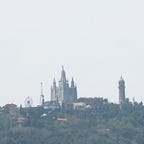When West German Buses Were East German Buses
During the Cold War, West Germany paid East Germany and East Germany gave it people. They were meant to be enemies, so why was the West giving the East money?
It was an exchange. The West saw itself as having a moral mission to bring people safely from the East. The East needed money. The West also needed skills. So the two states worked out a deal: some East German prisoners would be bused to West Germany, traded for money.
Lars Rutz, this week’s guest on Not What You Think, was one of those guys.
This was a period where East Germans couldn’t just walk across to West Berlin. The Berlin Wall was in the way. And you could get shot trying to cross it without permission.
Lars actually tried crossing it.
Because, why not do that if you were going to risk your life to get to the West?
If you didn’t get across the wall that way, there was the exchange. Of course, this exhange wasn’t something the East really wanted people to know about. It was a police state, which also spied on its citizens, on an unimaginable scale.
It did it pre-internet: with paper, analog photography and just a lot of people watching, listening and inferring. The West was officially an enemy. The East didn’t want people to know they were getting money from that enemy.
So they hid it.
The buses that ferried prisoners from East to West were East German buses, (paid for by the monied West) so no one in the East would wonder where these bus loads of people were going. But then in the West, to stop those buses drawing too much attention, the buses would get to the border and pull over. At the side of the road, someone would spin the license plates around. The plates now looked West German. And the newly-West German bus would drive its passengers to their new lives, in the West.
It was like a spy film. But, of course, spy films were actually like this stuff.
Lars got out.
Over time, in the West, Lars worked in museums, and as an archivist. He knows archives. Going back to a reunified Germany, years later, he read his own spy file, among the archives of spy files that the Stasi had amassed.
What would it be like to be an archivist and find yourself in an archive like that?
This week we have a special, extra long episode of Not What You Think as Lars explains how it was he ended up on one of these buses, what it was like growing up in bohemian East Berlin, to be spied on by Government spies (the Stasi).
And, to try to escape it.
Click through to our show page to hear Lars explain what it was like to be young in an environment like that, to try to leave it and what it means to read the spies’ files about his own life in Germany.
Not What You Think is broadcast 10:30am Saturdays in October, on Sydney’s FBi Radio. Listen live on 94.5 FM or the website, or subscribe to the podcast via our show page.
Zacha will be performing part of this show live this Thursday, October 2 at the Keepsakes radio listening party at the Good Room in Brunswich East, Melbourne.
